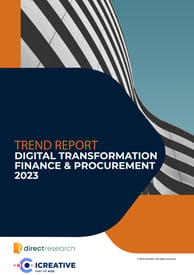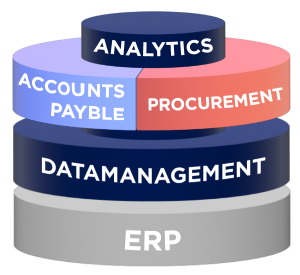
The Trend Report on Digital Transformation in Finance and Procurement reveals that nearly half of the corporates in the Netherlands do not have the majority of their indirect expenses under control. Independent research agency DirectResearch surveyed over 200 financial and procurement professionals, and it became evident that Finance, in particular, experiences maverick buying as a problem.
Maverick buying occurs when employees make purchases on behalf of the company outside of the established procurement process. For instance, it happens when employees buy goods and services from unauthorized suppliers or when they fail to comply with predetermined budgets and price agreements.
Mainly indirect expenses not under management
While direct expenses are usually managed well, it is the indirect expenses where employees tend to deviate from the established procedures. Given that approximately 20 to 40 percent of total orders in a corporate setting consist of indirect expenses, the impact of this issue should not be underestimated.
DirectResearch found that almost half of the corporations (45 percent) have the majority of these indirect expenses not under management. Therefore, the incidence of maverick buying is quite significant.
Why minimize maverick buying?
While it may be challenging to completely prevent maverick buying in a large company, it is essential to minimize it as much as possible for numerous reasons. For instance, in the case of maverick buying, favorable supplier terms and discounts are not negotiated, resulting in missed opportunities for cost savings.
Additionally, there is limited control over expenses, and Finance only becomes aware of the purchase when the invoice arrives. The employee then has to manually create a separate order and process it, wasting valuable time.
Moreover, maverick buying is non-compliant (as it deviates from established procedures) and lacks transparency. Suppliers are not pre-vetted or approved, which means you lose sight of who your company is actually doing business with. This can be detrimental to your corporate social responsibility objectives or even the organization's reputation.
Finance perceives maverick buying as a problem
Now, who within the organization is most affected by this issue? To find out, DirectResearch presented a statement to both financial professionals and procurement experts, yielding an interesting insight.
Among procurement professionals, a quarter of those surveyed (25 percent) agreed that unmanaged indirect expenses are a problem in their organization. One-third (32 percent) did not consider it a problem, and the rest remained neutral.
However, a significant 48 percent of financial professionals agreed with the statement that invoices without a preceding order or contract are a problem in their organization. Only 19 percent of financial professionals did not see it as a problem, while the rest remained neutral.
To conclude, Finance perceives maverick buying as a more significant issue than Procurement does. One possible explanation could be the extra workload that Finance must handle when an invoice arrives without an associated purchase order or approved supplier in the system. Procurement is probably less directly affected by maverick buying in their daily work.
Ample attention within the organization
With so many employees experiencing this as a problem, is any action taken to address it? Slightly over half of the procurement officers (54 percent) believe that their organization pays sufficient attention to bringing indirect expenses under management. Only one in seven procurement officers (14 percent) explicitly stated that there is insufficient attention to maverick buying. The rest of the respondents did not have a clear opinion on the matter.
As for financial professionals, about half (49 percent) stated that there is adequate attention given to reducing maverick buying. Seventeen percent of them specifically felt there was insufficient attention, and a third remained neutral.
In conclusion, many corporations are grappling with a high incidence of maverick buying. Finance, in particular, experiences the most challenges, partly due to the extra manual work involved. While most companies are aware of the problem, concrete action must now be taken to bring more indirect spend under management.
Full Trend Report available for free
Would you like to learn more about how corporations have structured their purchase-to-pay process and the implications for Procurement and Finance? You can download the complete trend report for free.
In the report, you'll find insights on:
- The extent to which corporations pay their invoices on time.
- How purchase orders and invoices are generated within Dutch corporations.
- The trends and developments influencing Procurement and Accounts Payable.








